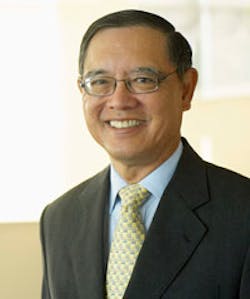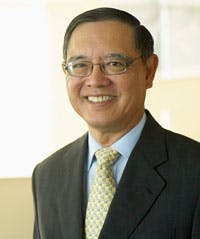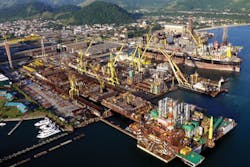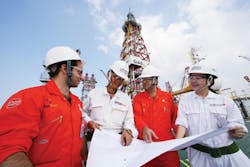Keppel aims to become the provider of choice for offshore and marine
EDITOR'S NOTE: Keppel Corporation Ltd. is one of Singapore's largest and most diversified conglomerates. The offshore and marine business unit is the company's largest component and is a leader in the construction of jack-up rigs for the offshore petroleum industry. Choo Chiau Beng, formerly head of the company's rig and shipbuilding arm, was named CEO in January 2009. This interview was conducted by the editors of Focus Reports LLC exclusively for Oil & Gas Financial Journal.
OIL & GAS FINANCIAL JOURNAL: Thank you for receiving us today. After spending many years in the offshore and marine division, you were appointed CEO nearly two years ago. The past 24 months have been marked by a very tough economic climate, which did not leave the oil and gas industry untouched. In spite of this, Keppel has managed to perform well. What is the secret to your success and which divisions have performed best for the company?
CHOO CHIAU BENG: The global financial crisis hit Singapore at the same time as my appointment in early 2009. The first priority was to review all the cash flows and cash commitments to ensure that the company could remain a sound ship. In the five years preceding the slowdown, Keppel performed very well and was able to build up a lot of financial reserves. The strong cash position and promising order book for the offshore and marine division made the company decide to focus on the execution element, making sure that the projects in the pipeline could be delivered on time and within budget. As a result, Keppel successfully delivered 14 rigs, 14 specialized vessels, and 6 major conversions and upgrades for various customers. Of course there were also some weaker clients that could not complete their contracts, but, overall, 2009 was a strong year for the Keppel Group.
When PetroChina pushed to buy Keppel's share in SPC, Keppel decided to proceed with the sale. PetroChina had specific targets for its oil and gas activities and the refining sector in particular. With the sale, SPC would go into stronger hands and enjoy better growth. Since then, PetroChina has taken the company private by acquiring the rest of the shares. Effectively, SRC currently has two major shareholders – PetroChina owns 30% via SPC, and Chevron owns 50%. In the meantime, Keppel has been able to capture some of the value that the company invested in SPC over the past 10 years. This has helped to further strengthen the balance sheet of the group.
Next, the company has issued rights for Keppel Land in order to strengthen the balance sheet of that division further. Several investments were also made to strengthen Keppel's footprint in the environmental engineering business. Keppel took over two waste-to-energy plants from the Singapore government. In line with this, a water and district cooling plant was also acquired. Keppel continues to look to invest into its core business which remains to be offshore and marine. The company firmly believes that it is able to position itself in its different markets. This is reflected in the company's results last year when record profits were reached.
OGFJ: Last year you declared that with the sale of SPC you would seize new opportunities in the market. But by looking at the market, we see that many companies seem to be waiting to invest…
CHOO CHIAU BENG: First of all, the European crisis has had an obvious impact on the industry. Nevertheless, Singapore managed to recover very sharply following the negative growth last year thanks to its ability to respond very quickly to the market, both in terms of consumption and supply. Opportunities will continue to arise in many locations, but for Keppel it is more important to pursue the right opportunities. In the backlog of the Deepwater Horizon catastrophe, Keppel sees itself well positioned in the Gulf of Mexico, Brazil, the North Sea, the Middle East, and the Caspian region.
OGFJ: You didn't mention West Africa. Isn't it the future of the deepwater industry in the next 10 years?
CHOO CHIAU BENG: Keppel is looking at Africa as well and planning its strategy on how to take advantage of the developments in this continent. Nevertheless, Keppel is less familiar with Africa. There may be an opportunity for Keppel's activities in Brazil to take advantage of potential in Angola and Mozambique. At the end of the day, West Africa continues to be a challenging operating area, and Keppel does not intend to expand there at this time.
OGFJ: Keppel and Singapore have an image of pragmatism, efficiency, and fast reaction to market changes. These values are hard to put in place in locations with a different culture. How do you deal with this?
CHOO CHIAU BENG: Singapore is small, which gives the country the ability to be more agile. For Keppel in particular, the key ingredient is having the right talent and people to ensure the continuity of the company. There is a strong focus on renewal, succession, and careful planning while maintaining a long-term view. The future will be a question of making the best out of new opportunities.
OGFJ: Just yesterday, the prime minister once again commented that renewing human resources would probably be Singapore's biggest challenge for the coming years. Despite your international presence, you are still a Singaporean company. Do you concur with the prime minister's view?
CHOO CHIAU BENG: It is very likely that human talent will be the biggest challenge because in order to go forward, the company needs motivated and talented people. Whether they are Singaporean or not does not really matter. What is essential is that they have the same values to drive the company forward in a safe manner without generating too much risk.
OGFJ: For the offshore and marine sector in particular, we see more and more demand for tailor-made, highly-specialized solutions. Keppel has built its success on its ability to respond to these specific consumer needs. As the company grows bigger, how will you manage to continue offering such individually tailored solutions to your clients?
CHOO CHIAU BENG: This philosophy and the capability to specialize will remain present within Keppel because of the company's "near market, near customer" strategy for its offshore and marine business. This strategy has worked very well in the past and will continue to do so. The oil-producing countries have become more nationalistic and increasingly encourage local content. Keppel's success in Brazil is a sign that the company has the capabilities to pursue this strategy.
Seamless integration - After a successful preconversion at Keppel Shipyard in Singapore, FPSO P-57 had her newly fabricated topsides installed and integrated at Keppel FELS Brasil's BrasFELS yard.
Photo courtesy of Keppel Corp.
Korean shipyards, for example, are remarkably strong because of their strong discipline. Nevertheless, outside Korea they are much more limited. Whatever special advantage these companies have disappears when they have to operate in a level playing field. Keppel has experience working within different cultures and local environments for more than 30 years. The company has been present in the Philippines for 35 years, in Brazil for more than 10 years, in the USA for 20 years, and so on. By working in local markets with local talent, Keppel has acquired the flexibility to respond to local demand and has been able to respond to the need for customization.
Through its near market, near customer strategy, Keppel brings its expertise to the doorsteps of its customers and markets.
Photo courtesy of Keppel Corp.
OGFJ: Is this a trend that will continue in the industry?
CHOO CHIAU BENG: The industry has no choice because each environment has different requirements. Even though these requirements are not always that predictable, they will always play an important role. A critical success factor is to have the right team in place. And for Singapore in particular, there is no room to make mistakes. Keppel Corporation is a small company and needs to make sure to do the right thing.
OGFJ: You describe yourself as a small company, but you are the leader in your market. Keppel's reported results for the first half of 2010 were generally encouraging and demonstrated growing profits. Nevertheless, there is some concern about declining offshore and marine revenues. How do you explain this discrepancy, and do you see a change soon?
CHOO CHIAU BENG: Keppel has been quite clear that a repetition of the earlier order book will not happen very soon. While there is some decrease, the growth areas will be specialized markets such as Brazil and the niche for sustainable development. The company is not too rigid and is in fact more flexible than most people expect. Profits have been very good because of good margins on most projects during the peak period. Additionally, because of its learning curve, Keppel is able to become increasingly efficient and squeeze cost out of its projects. The results are a reflection of this hard work.
OGFJ: When we look into renewable energy and your core expertise in offshore…
CHOO CHIAU BENG: Crucial to this diversification is the joint venture with the Seafox Group, which led to the only vessel that can reliably install wind farms in more than 60 meters of water. No one had done that before us. The announcement of Keppel servicing this new niche led to numerous inquiries from various players interested in such products. One of the challenges of installing a wind farm is to find suitable equipment – thus it is important to develop the right tools for this market. The important areas to expand into for this niche will be the UK and Germany. The entry into this niche is one of the largest projects for Keppel at present. The design is ready and the company is now ready to start building. As soon as Keppel is required to build more, it will not hesitate to do so.
OGFJ: The company has always been diversified. For example, Keppel has made a foray into waste-to-energy (biomass) with a key project in Tanjin, China. Did you ever consider that Keppel's knowledge in offshore equipment, fabrication, design, etc. could lead to a chance of Keppel moving into oil production?
CHOO CHIAU BENG: The acquisition of SPC reflected Keppel's aspiration for this sector, but did not lead to satisfactory results. As a rule of thumb, the oil industry requires scale. Therefore, Keppel needs to work together with the right partners on the right kind of projects to find good leverage and come up with a winning formula. Thus, the company will look out for the right kind of projects that can use the expertise of the Keppel Group. Together, the company can build expertise in the oil and gas industry to create value for all stakeholders, which is not so easy to find. Keppel partners with suppliers, customers, and so on, to see how it can create value for shareholders and customers. Keppel is always looking for new opportunities.
OGFJ: You mentioned it will be tougher and tougher for Keppel's offshore and marine division, with increasingly specialized and novel solutions in new niches. Does this mean that the O&M division will decrease within your portfolio, in favor of infrastructure and property as you look into higher margin markets?
CHOO CHIAU BENG: Not necessarily. The offshore and marine division still constitutes a substantial amount of Keppel's business and employs a large number of people. Offshore and marine currently contributes approximately two-thirds of the company's profit. So in many ways, the long-term target will be to grow all the legs of the business.
OGFJ: Speaking about the infrastructure division, the synergy between this division and the offshore leg is probably expertise in engineering solutions and close relationships with customers. What other synergies do you see between these two activities?
CHOO CHIAU BENG: The main synergy is the people. In addition to this, the financial strength of Keppel Corporation helps to make large projects happen. We see that the growth of infrastructure will be there for many years. Today, China has caught up well with infrastructure, but there are many countries with potential, such as Vietnam, Indonesia, India, and so on. Even the USA has not spent enough money on infrastructure, which is now becoming increasingly older. One day, the US will need to wake up and increase building activity for new infrastructure. France and the rest of Europe have already been rebuilding and improving their infrastructure over the years. Of course, also Latin America and Africa offer a vast amount of opportunities.
OGFJ: But Africa is a very challenging environment. China, however, is currently very active in building infrastructure there.
CHOO CHIAU BENG: That is true. Keppel's people do not understand the culture, and we do not have people that feel comfortable working there. China's presence is very much related with that country's goal to secure long-term resources in that region. One of the things that Keppel learned from working with China is that very soon, your knowhow becomes their knowhow. They are able to rapidly obtain the right people and resources to execute projects without you. For example, with wind turbines in particular, China started developing its own technology based on European knowhow.
OGFJ: In Singapore, the infrastructure is already in place and there is not much room for expansion. You mentioned different geographical regions offering high potential for the infrastructure division. What is your strategy to replicate the success that you had when internationalizing the offshore and marine business?
CHOO CHIAU BENG: In order to understand how things work in a particular country, you do not need to re-invent the wheel. This is something that can already be done by other divisions. It takes some time to learn about the culture and rules of the game in a new market. With infrastructure, this is especially important, as you are not flexible to move away after investing.
OGFJ: A big difference between both divisions must be the end customer. In terms of red tape, private companies tend to be very fast and efficient. With infrastructure on the other hand, you deal with government, administration, and so on. This seems like a totally different ballgame.
CHOO CHIAU BENG: I agree, but Keppel has done this with its property business as well. And in fact, in many cases in the offshore business, you still face the environmental bodies, local authorities, etc.
OGFJ: Where is the growth for Keppel coming from in the coming years?
CHOO CHIAU BENG: If Keppel can find the right business, the right contracts, the right customers, and the right partners, the growth will come from all three legs of the business.
OGFJ: What has been the main focus of your work since you became CEO?
CHOO CHIAU BENG: It has been to maximize value for the shareholders and to continue to develop existing and additional customers for the business. The customers, the shareholders, and the employees are three very important stakeholders for the company.
OGFJ: Do you have a final message for the readers of Oil and Gas Financial Journal?
CHOO CHIAU BENG: Demand for energy will continue to grow – in particular in the developing world – and oil and gas will remain a very important component in this energy mix. Renewables will not replace oil and gas in the next 20 years. In Keppel's area of oil and gas, the easy reserves are largely found onshore but there is a need to learn to address more difficult areas such as deepwater, harsh environments, and the arctic. Singapore is a service hub that helps grow the industry globally. The point to take away about the company is that Keppel is a service provider as well as a manufacturer. The company's main focus is to become a provider of choice for offshore and marine, sustainable environment, and urban living solutions.
OGFJ: Thank you very much for your time today.
More Oil & Gas Financial Journal Current Issue Articles
More Oil & Gas Financial Journal Archives Issue Articles
View Oil and Gas Articles on PennEnergy.com



